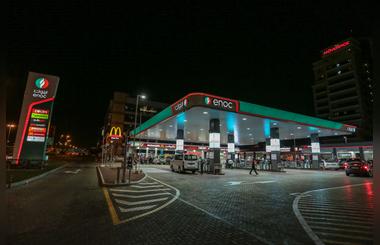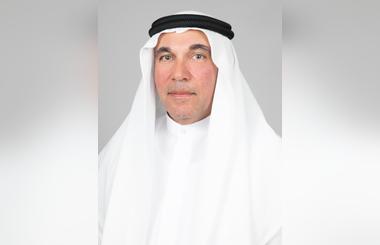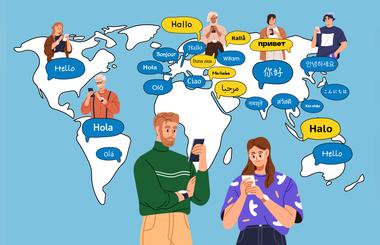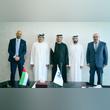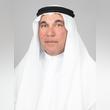
- ID Number 24204
- Aug 08, 2023
- 202
Cultural Programs and Heritage Festivals Committee Abu Dhabi Organises the Third International Festival of Falconry in December 2014
Under the patronage of His Highness Sheikh Khalifa bin Zayed Al Nahyan, President of the United Arab Emirates (may God protect him), the Cultural Programs and Heritage Festivals Committee Abu Dhabi organises the activities of the 3rd edition of the International Festival of Falconry (Bayzarah) from the 7th to the 13th of December, 2014 in the Emirate of Abu Dhabi. The new edition will be characterised by the participation of about 75 countries represented by more than 500 falconers, experts, researchers, officials and representatives from the UNESCO and other international organisations concerned with the preservation of the heritage of falconry, and the protection of the environment.
Adviser for Culture and Heritage in the Court of the Crown Prince of Abu Dhabi, and Chairman of the Cultural Programs and Heritage Festivals Committee Abu Dhabi, HE Mohammed Khalaf Al Mazrouei, said that the Festival enhances Abu Dhabi's stature as a top cultural destination on both regional and international levels. The Festival also provides an outstanding environment for the exchange and dialogue between civilisations and cultures, and offers a rare platform for the gathering of peoples, organisations and individuals who hold a special interest in falconry. The main objective consists in the promotion, protection and development of this heritage. Considered as one the most significant pillars of the national identity, falconry is also inscribed on the UNESCO's Representative List of the Intangible Cultural Heritage of Humanity.
The organisation of the Third International Festival of Falconry comes in line with the strategy of the Cultural Programs and Heritage Festivals Committee, which works towards the preservation of the cultural heritage, and the sustainment of the cultural memory. The Committee also acts to disseminate the civilisational and humane message of the UAE to the different cultures and peoples of the world. All these efforts help in the promotion of the UAE as a nation that has succeeded in reconciling between the present with all its developments and characteristics and the past with its authenticity, genuineness and culture, added Mazrouei.
The Festival complements the Abu Dhabi International Hunting and Equestrian Exhibition (ADIHEX) which is organised annually in the Emirati capital. Both events seek to promote the heritage of the UAE, highlight the entrenched history of the Emirati people and transform the Emirate of Abu Dhabi into a regional hub for cultural heritage.
The events and activities organised by the Committee comprise a number of other festivals and exhibitions that complement each other, notably Al Dhafra Festival, the Liwa Date Festival, the Baynounah Camel Mazayna (beauty contest), and Al Gharbia Watersports Festival. All these events and activities are organised in line with the vision and objectives of the Committee, Mazrouei explained.
The International Festival of Falconry enjoys a significant international following and reputation, and draws hundreds of falconers, experts, and specialists from around the world. It features several activities, and mega educational, art, and cultural competitions that will leave a strong impression on the lovers of falconry and desert environment. The Festival is also an occasion to display the various efforts of the UAE in the fields of sustained hunting and the protection of falconry as part of the international heritage.
The programme of the Festival includes the establishment of desert camps, the organisation of a scientific conference and a rich set of activities as well as cultural and art competitions that appeal to all interests and age groups. The programme also features specialised scientific, art, and cultural exhibitions and stunning folklore performances that reproduce the aspects of the falconry practice in various societies in the Middle East, Africa, Europe, Japan, China, Eastern Asia, and the United Sates.
The Festival is considered by international experts as the biggest gathering of falconers in history and as a unique international competition. In its 2nd edition in the city of Al Ain in 2011, the Festival managed to draw falconers from across the UAE, provide an opportunity for the exchange of skills, strengthen the bonds between falconers, and bring to light different experiences from around the world.
In 1976, the 1st edition of the Festival was honoured by the patronage and attendance of late Sheikh Zayed Bin Sultan Al Nahyan (may God bless his soul), in line with the keenness of His Highness to preserve the entrenched heritage of the nation, and transmit the authentic customs and traditions to future generations. At a very early stage, His Highness foresaw the urgent need to strike a balance between the preservation of the entrenched heritage of falconry and the maintenance of the population of falcons and their preys in the wild. His unique vision outlined a pressing action that was later branded by contemporary environmentalists as the principle of sustained hunting. Sheikh Zayed was not only ahead of all the advocates of environment protection but also a perfect example of the Arab falconer, with his honest intuition, and extensive knowledge of nature, Mazrouei said.
In the previous edition that was held in the city of Al Ain in 2011, the Festival enjoyed the generous support of His Highness Sheikh Khalifa bin Zayed Al Nahyan, President of the UAE (may God protect him). About 75 delegations from different countries took part in the Festival, which featured several outstanding and ground-breaking activities. A number of national camps for the participating countries were set up in the vicinity of Al Jaheli Fort, notably the Asian Steppes Village (which constituted a unique opportunity to meet Kazakhs and Mongolians who hunt with golden eagles), the Conic Village of North America (which put on view the culture the American Indians), and the North Africa Village (which revealed to the visitors the interest of North African countries in falconry), Mazrouei said.
The Festival hosted 10 specialised exhibitions of painting and photography, in addition to the Heritage of Falconry in the United States Exhibition, the Conservation of Raptors Exhibition, and the Conservation of Prey Exhibition. The Education Exhibition was run by the UK Birds of Prey and Conservation Centre. The Rehabilitation Exhibition dealt with the care given to the injured birds of prey and the process of their return to a successful life in the wild. The Hawking Dogs Exhibition presented the different breeds of dogs that have hunted with falconers for centuries. The International Wildlife Consultants Exhibition showcased some of the work done on behalf of the UAE over the last 22 years. There was also an Exhibition of the International Association for Falconry and Conservation, he added.

AAICO and Decoding Data Science Celebrate the Succ...
- Mar 11, 2024
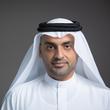
GCC revealed as top export and re-export market fo...
- Mar 06, 2024
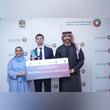
Federal Tax Authority Hosts Hackathon to Present C...
- Mar 06, 2024

